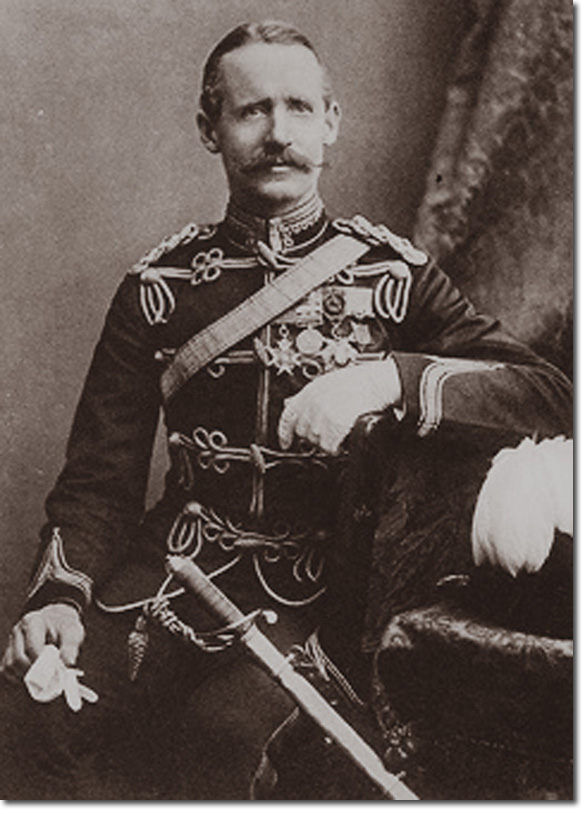|
|

 |
|
The Honourable George Hugh Gough, son of the second Viscount G. H. Gough was born 25 July 1852. He was educated at Eton and Trinity Hall, Cambridge, where he graduated BA in 1872 and entered the army as a Cornet in the I4th (King's) Hussars on 28 Oct 1871. He rose to the rank of Lieutenant-Colonel, commanding the 14th (King's) Hussars from 1 July 1891 to 30 June 1896, being stationed at Hounslow, Aldershot, Leeds, Manchester, and Cahir.
His career included many staff appointments which took him to such places as South Africa 1881, Egypt 1882 where his horse was killed at Tel-el-Kebir, and the Sudan in 1884/5, being wounded at Abu Klea. When H.M. Queen Victoria opened the Manchester Ship Canal on 21 May 1894, the 14th (King's) Hussars and the 2nd (King's) Liverpool Regiment lined the route of the royal procession through Manchester, on which occasion the whole of the troops, including the volunteers, were under the command of Colonel the Honourable G. H. Gough, and on the 26th of the same month he was awarded the Companionship of the Bath (Military Division). When the South African War broke out, Colonel Gough was appointed AAG of the Cavalry Division in October 1899, and proceeded to Cape Colony, where he served till his much-lamented death, which occurred on the 28 March 1900 at Norval's Pont, to the inexpressible grief of his numerous friends and brother officers, with whom he was most popular. He was buried with full military honours on the 3Oth March, in the cemetery at Bloemfontein, a squadron of his old regiment being present at the ceremony. The Daily News correspondent at the seat of war states in a wire published on 2nd April in the Westminster Gazette, that: 'Lord Roberts and other officers holding high command followed the remains of Lord Wolseley's former private secretary to the grave. It was an impressive sight as the procession moved solemnly through the streets of Bloemfontein, the troops walking in a slow march, with arms reversed, and bands playing the Dead March. The coffin was covered with the Union Jack and wreaths of flowers. At the cemetery the trumpeters sounded the Last Post over the grave of the soldier whom all comrades honour.' The same journal also contains the following from a military correspondent in South Africa: 'Colonel the Honourable George Gough, George, as he was affectionately known to all his intimates will be sincerely mourned by all who knew him. His friends were legion. Few officers were able so quickly to gain the affection and respect of all privileged to serve under him, and few officers will be so missed and so regretted. The last time I saw him was, I think, in 1895, when he won the open military point-to-point race in County Meath, over a big country, riding against all the best men of the Dublin garrison, and further handicapped by the fact that the country was absolutely strange to him. I shall never forget seeing him cantering home, bare-headed, some fifty lengths in front of the foremost of his pursuers, his face radiant with delight at his victory. I think that no officer in command of a regiment, and he was then in command of the 14th Hussars, has ever before or since won this race. When men come to command they are usually not so keen about racing over a country. Not so George Gough, no day was too long and no fence was too big for him. He was in every way the beau-ideal of a light cavalry officer.' A former colleague writes to the Army and Navy Gazette of 4th April as follows: 'I cannot tell you how shocked we all are to hear the news of the death of Colonel the Honourable George H. Gough CB. A truer-hearted and more upright and honourable gentleman, a better soldier, and more courteous and industrious official, never served on the staff at headquarters. To know him was to feel affection for him; to be associated with him in office was to admire the abilities which were hidden under that quiet yet manly exterior. He was an officer who was capable of anything, for like most quiet men he was blessed with wonderful powers of judgment, whilst his knowledge of the duties and requirements of his own arm of the service was exceptional. In his death the army has indeed sustained a great loss, and throughout the War Office he will be sincerely mourned.' |
Regimental Details | 14th Hussars Commanding Officers
Armed Forces | Art and Culture | Articles | Biographies | Colonies | Discussion | Glossary | Home | Library | Links | Map Room | Sources and Media | Science and Technology | Search | Student Zone | Timelines | TV & Film | Wargames